
18th to 23rd August 2025
CELEBRATING 50 YEARS!

18th to 23rd August 2025
CELEBRATING 50 YEARS!

Conductors for the 2025 Course


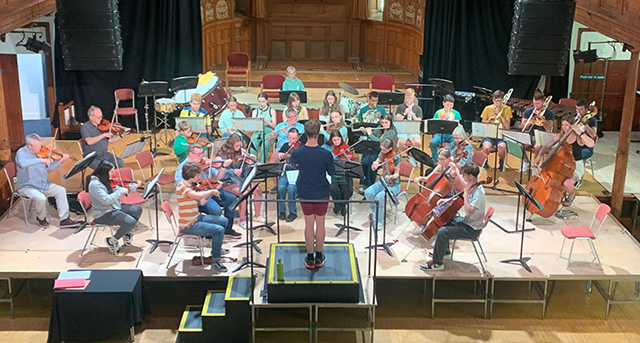
James is a conductor, composer, afrobeat, jazz and fusion multi-instrumentalist, and educator with more than a decade of experience performing, recording and teaching in the UK, Europe and West Africa. After holding three conducting residencies in London as well as working with Netflix, the video game industry and further education institutions, he has moved to Valencia to pursue original projects including an opera commission.
After moving to Guernsey with his family in 2012 James studied at the Grammar School before graduating with First Class Honours in Music from the University of Manchester, after which he went on to gain a Distinction in a Masters in Composition and Conducting. In the course of this he benefitted from master-classes from many conductors, including Sir Mark Elder with the Hallé. He received many academic awards and also the prize for Best Conductor at the 2016 National University Brass Band Competition, leading the university band to victory as well. He also conducted the University String Society and was a conductor and tutor for the Stockport Schools’ Brass Band Service.
Since leaving university he has worked with many contemporary composers and was arranger, conductor and performer of music for Season 3 of Netflix’s ‘Sex Education’. He has also collaborated with musicians as varied as Chris Martin from Coldplay, The Specials, Harrison Birtwistle and award-winning jazz trombonist Mark Nightingale. He was Conductor of the South London Jazz Orchestra and the Holborn Symphony Orchestra, as well as Guest Conductor for many UK and Channel Island ensembles, until December 2023 when he moved to Spain to continue his work as Consulting Ethnomusicologist and Commissioned Composer for the Spanish National Research Council. He is also putting together an impressive Discography.
For more information about James and his career visit:
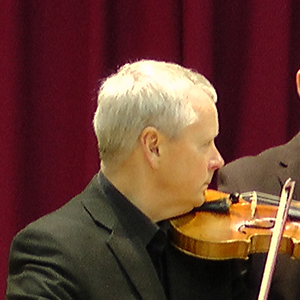

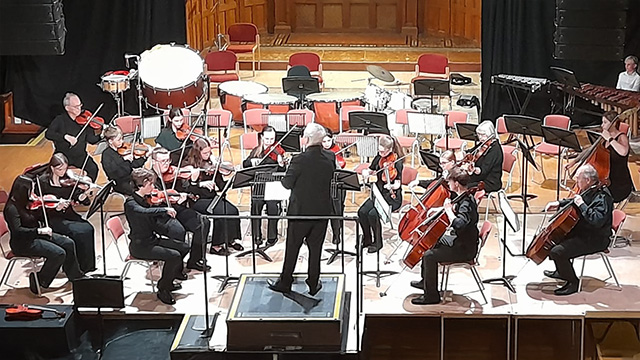
Roger Coull has been principal conductor of the Warwickshire Symphony Orchestra since 2014. His international performance experience and musical versatility have earned him invitations to conduct for various orchestras, including the Beauchamp Sinfonietta, the Guernsey Symphony Orchestra, the Helix Ensemble, and the Crendon Chamber Orchestra.
Roger Coull’s musical journey began at the Royal Academy of Music in London, where he studied violin and formed the Coull Quartet. They quickly gained recognition as one of Britain’s leading string quartets. In 1977, they were appointed as the quartet-in-residence at the University of Warwick, a position they held for four decades. The Quartet has performed in concerts and radio broadcasts across Britain, and the world.
The Coull Quartet also boasts an extensive discography featuring a huge range of repertoire including both standard classsical works and more contemporary compositions.
He is also a respected teacher, giving masterclasses internationally, and is a regular guest at Britain’s music colleges as a teacher, examiner, and adjudicator. He has been awarded a Fellowship of the Royal Academy of Music for his services to professional music making.
Roger has been tutoring and conducting on ECSOC since the second course in 1976!
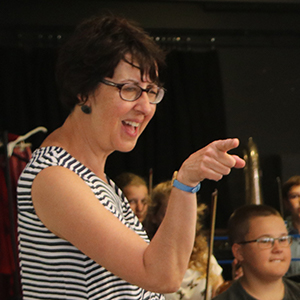

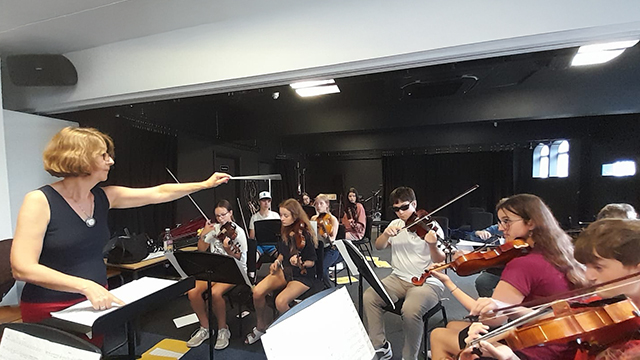
After many years as Head of Strings at Sherborne School, Sarah is now in the
equivalent position at The Latymer School in North London.
After graduation from the RCM she
joined the Asturias Symphony in
Spain before returning to the UK
where she worked in several
orchestras and ensembles
throughout the country, including
performances at the Proms, in
West End shows and on commercial recordings.
She has taught all ages and standards and has been a council member of the
European String Teachers Association and given many lectures for them.
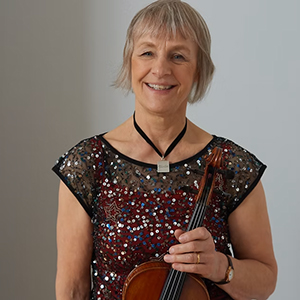

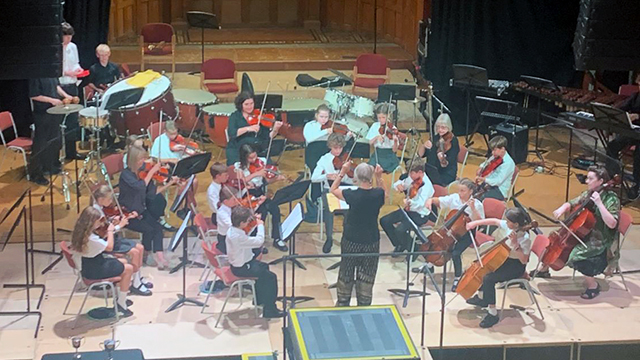
Julia has had a busy career, both as a teacher and a performer. Her freelance work has included The Royal Philharmonic Orchestra, Northen Ballet and playing with the ensemble at The Ritz Hotel. She is a member of the Astor String Quartet. Julia worked in Parma, Italy for a season and was a member of the Trondheim Symphony Orchestra in Norway.
Julia was Head of Strings at St Dunstan's College for 16 years. She has also taught at the Junior Royal College of Music and Junior Trinity College of Music.
Currently she teaches at Rosemead Prep School in Dulwich and is a regular tutor on the South London Youth Orchestra.
Julia has been conducting the String Group at ECSOC since 1987! She strongly believes that the String Group should receive an all-round musical experience. Rhythm and listening games, improvisation, sight reading, singing and technical exercises are incorporated into daily rehearsals.
The emphasis is on having a fun week as well as achieving a high standard of performance. The basics of good orchestral discipline are nurtured in a relaxed atmosphere.
When in Guernsey, Julia loves her daily sea swims, walking on the coastal paths as well as eating fish and chips at Cobo and finding a good slice of Guernsey gâche with butter!
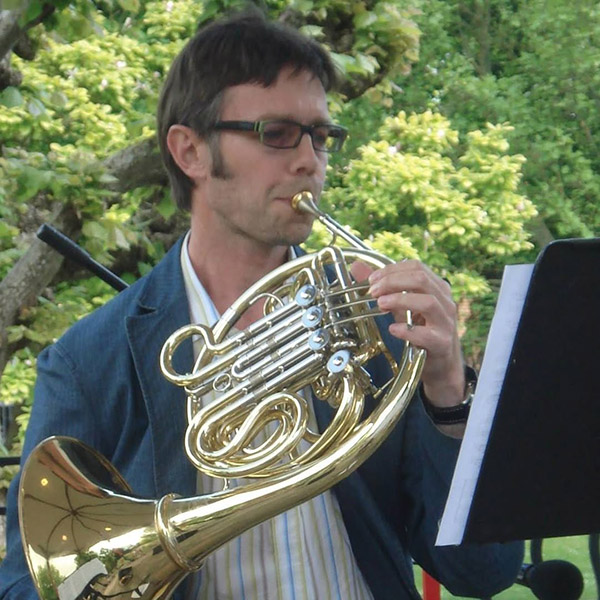

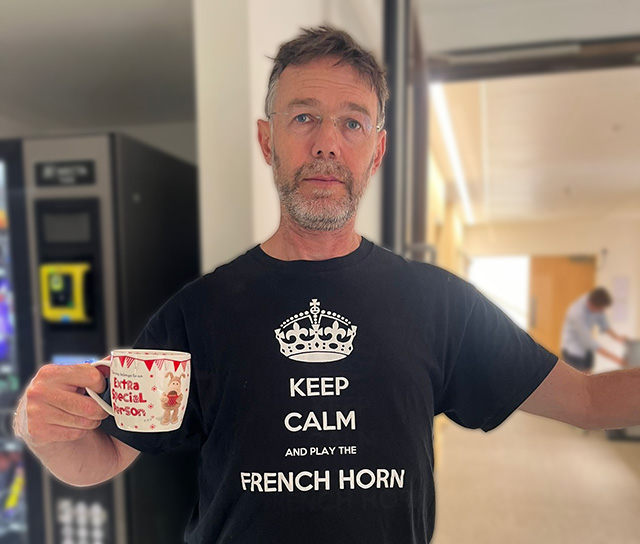
Dave was Principal Horn in the Young Musicians’ Symphony Orchestra and graduated as an Associate of the Birmingham School of Music in 1993 in both performance and teaching before undertaking a postgraduate Associate year at the RCM. He has subsequently played in many orchestras and ensembles in the UK, including as Principal Horn in the English Camerata and the Mid Wales Opera Orchestra.
He also has wide experience in music teaching, including at the Purcell School, St George’s College, Weybridge and most recently at Castle Court and Perrott Hill Preparatory Schools in Dorset.
He worked for the Guernsey Music Service from 2002 until 2007, since when he has worked for services in Bedfordshire, Northamptonshire and Dorset.
His musical interest and experiences range from salsa and samba to brass quintet and through to full symphony orchestra.
He has widespread conducting experience from his teaching work in schools and music services and with several groups in Dorset since moving there in 2009 and has recently been appointed as Musical Director of the Weymouth Concert Brass from January 2025.

Safeguarding Team |
||
|---|---|---|
| Course Director (CD) | Charlie Cottam | 07781 109044 |
Other agencies |
||
| Guernsey Child Protection overview | Overview & Child Protection Awareness (Level 1) | |
| MASH (Multi-Agency Support Hub) Health and Social Care (HSC) |
Duty Social Worker (HSC) Referral | 01481 723182 |
| Emergency Duty Team (out of hours) | 01481 725241 | |
| CAMHS | Child and Adolescent Mental Health Services | 01481 701441 |
| Guernsey Police Contacts | Public Protection Unit (PPU) | 01481 719419 |
| Police (out of hours) | 01481 725111 | |
| Disclosure and Barring Service (DBS) | PO Box 181, Darlington, DL1 9FA | 01325 953795 |
| NSPCC | 24 hour helpline for anyone concerned about the welfare of a child | 0808 800 5000 |
| NSPCC whistle blowing helpline | 0800 028 0285 | |
If you have an immediate concern about a life being at risk or you believe a crime to be taking place, call 999.
1.1 Introduction Statement
1.2 Aims
1.3 Implementation
1.4 Roles and Responsibilities
1.5 Concerns and Complaints Procedures
2.1 Introduction Statement
2.2 Staff responsibilities and communication (staff guidance)
2.3 Allegations against staff
2.4 Allegations against pupils
2.5 Record keeping
2.6 Missing Pupils
2.7 Sexting
2.8 Self-Harm
2.9 Unexplained absences
I Introduction Statement
II Staff responsibilities and communication (staff guidance)
III Allegations against staff
IV Allegations against pupils
V Record keeping
VI Missing Pupils
VII Sexting
This will ensure that an investigation (where necessary) can be carried out to ascertain the full facts and a pupil can be removed from a potential source of harm or neglect.
Appendix I:
|
RECOGNISING ABUSE |
Listed below are some of the signs and types of behaviour, which may indicate that a child is being abused. In isolation they are not necessarily evidence of abuse, but may suggest abuse, particularly if a child exhibits several of them, or if a pattern emerges of when or how a child exhibits such signs or behaviour. If abuse is suspected, it is necessary to identify what it is specifically, that is causing concern.
Reluctance to go somewhere or to stay with someone
Loss of appetite
Clingy, highly dependent behaviour
Regressive behaviour
Passivity or very compliant behaviour in relation to adults
Nightmares, fear of sleeping without a light, reluctance to go to bed
Fear of going to school, school problems
Unwillingness to undress/change
Display of affection in inappropriate ways
Depression
Withdrawal/Secretiveness
Poor self-image (may neglect grooming and hygiene)
Lack of involvement in school activities (grades may fall)
Skipping school or avoiding going home
Excessively seductive behaviour
Running away
Self-harm
The signs and indicators of abuse for disabled and non-disabled children are fundamentally the same. But for some disabled children signs and indicators may be more difficult to recognise, be harder to untangle – especially if there are communication difficulties/impairment. Symptoms may also be more easily explained away:
|
More Specific Signs and Types of Behaviour |
It is the combination of symptoms, which could give rise to concern. Any of the symptoms could be indicative of other conditions unrelated to abuse.
The following is a summary of some of the indicators that may suggest a child is being abused or is at risk of harm. It is important to recognise that indicators alone cannot confirm whether a child is being abused. Each child should be seen in the context of their family and wider community, and a proper assessment carried out by appropriate persons. What is important to keep in mind is that if you feel unsure or worried, do something about it. Don’t keep it to yourself.
Physical Abuse Most children collect cuts and bruises quite routinely, as part of the rough and tumble of daily life. Clearly, it is not necessary to be concerned about most of these minor injuries. But accidental injuries normally occur on the bony prominences, e.g. shins. Injuries on the soft areas of the body are more likely to be inflicted intentionally and should therefore make us more alert to other concerning factors that may be present. |
Factors that should arouse concern
In the social context of the school, it is normal to ask about a noticeable injury. The response to such an enquiry is generally light-hearted and detailed. So, most of all, concern should be aroused when:
You should be concerned if the child or young person:
Physical harm may also be caused when a parent or carer fabricates the symptoms of, or deliberately induces, illness in a child. |
Emotional AbuseMost harm is produced in “low warmth, high criticism” homes, not from single incidents. |
Signs which may indicate emotional abuse:
Neglect Neglect is a lack of parental care. It is the actual or likely persistent or significant neglect of a child, or the failure to protect a child from exposure to any kind of danger, including cold or starvation, or persistent failure to carry out important aspects of care, resulting in the significant impairment of the child’s health or development, including non-organic failure to thrive. Neglect can include parents failing to:
|
|
Indicators of neglect The following is a summary of some of the indicators that may suggest a child is being abused or is at risk of harm. Neglect is a difficult form of abuse to recognise and is often seen as less serious than other categories. It is, however, very damaging: children who are neglected often develop more slowly than others and may find it hard to make friends and fit in with their peer group. They may also be bullied. |
Signs which may indicate neglect:
Sexual Abuse Sexual abuse is actual or likely sexual exploitation of a child; the involvement of children and adolescents in sexual activities which they do not truly comprehend, to which they are unable to give informed consent or which violate the social taboos of family roles. Sexual abuse is usually perpetrated by people who are known and trusted by the child, e.g. relatives, family friends, neighbours, babysitters, people working with the child in school, faith settings, clubs or activities. Characteristics of child sexual abuse:
Most people who sexually abuse children are men, but some women sexually abuse too. |
Indicators of sexual abuse |
Medically there are other indicators, but these will not be apparent at school.
Appendix II:
CODE OF CONDUCT FOR STAFF
Self - Protection for Staff
A. Introduction
In seeking to uphold the best interests of our students, Staff must be mindful of their position of trust. This Code of Conduct is intended to assist staff in respect of the complex issue of child abuse, by drawing attention to the areas of risk for staff and by offering guidance on prudent conduct.
B. Code of Conduct
1. Private Meetings with Students and individual tuition and coaching arrangements.
2. Physical Contact with Pupils
3. Teaching
4. Relationships, Attitudes and Social Interaction
Staff should seek advice from the CD if they do not feel comfortable with a student’s request to speak to them. Similarly speak to the CD if you are concerned about a student’s interest in you.
5. Communication with students using technology
Communication with children and staff, by whatever method, should take place within professional boundaries and staff should avoid any personal subject matter. This includes the wider use of technology such as mobile phones, text messaging, emails, digital cameras, videos, webcams, websites, social networking and blogs.
Staff should be circumspect in their communications with children so as to avoid any possible misinterpretation of their motives or any behaviour which could be construed as "grooming". For this reason staff should not have students as ‘friends’ on their personal pages on social network sites such as Facebook.
Staff should not give their personal contact details to students, including email, home or mobile telephone numbers, unless the need to do so is agreed with the Course Director.
6. Whistle blowing
It is important to develop an environment which supports the reporting of concerns. Fostering an open culture encourages transparency and will help individuals to feel supported and listened to. The Course is committed to the highest standards of openness and accountability and expects tutors who become aware of activities which they believe are illegal, improper, unethical or otherwise inconsistent with this code of conduct to report the matter to the Director.
In particular, with regards to safeguarding, all staff are required to report to the Director any concern or allegations about the behaviour of colleagues which are likely to put students at risk of abuse or other serious harm. There will be no retribution or disciplinary action taken against a member of staff for making such a report provided that it is done in good faith.
Conclusion
It would be impossible and inappropriate to lay down hard and fast rules to cover all the circumstances in which staff interrelate with children and young people, or where opportunities for their conduct to be misconstrued might occur. Nonetheless, any suspicions of abuse or inappropriate behaviour by a colleague should always be reported to the Designated Safeguarding Lead.
Staff are responsible for their own actions and behaviour and should avoid any conduct which would lead any reasonable person to question their motivation and intentions. Staff should always work, and be seen to work, in an open and transparent way.
Appendix III
RESPONSE TO DISCLOSURE OF ABUSE
Guidance for Staff
When a child discloses abuse, the way in which you respond is crucial.
It is important to take the disclosure seriously and make a response that includes all of these five statements in some form.
Never promise confidentiality
If you suspect abuse or if a child discloses it to you, you are required to report it as soon as possible to the CD. If they are not available you should report it to the HSC or the police.
You should otherwise keep the disclosure confidential. This means respecting the young person’s right to privacy except where their safety or well-being is in question. Sometimes you will need to consult with someone about what steps to take, so you will need support for unsettled feelings after receiving a disclosure.
In these situations it is appropriate to talk to another adult about it, keeping in mind the child’s right to privacy.
If a student tells you something…
YOU MUST NOT ask leading questions or investigate the allegations of abuse.
Appendix IV
Recording a concern
As well as the name of the child and the details of the observations, you should also include in your record:
Distinguish fact from opinion. The emphasis should be on facts – what you saw and what you heard. If you are writing a record of what a child or adult said, keep as near to the exact words that were spoken as possible. You may want to include some information about how you interpreted your observations. This may be helpful, but should be clearly distinguished from the facts. Other kinds of opinions should be avoided.
Appendix V
GUIDANCE FROM THE GUERNSEY EDUCATION DEPARTMENT
Safeguarding Children and Child Protection
The Children Law (Guernsey & Alderney) 2008 states that all States Departments have a duty to work together & share information to ensure that children get the services they require. This is also essential to protect children and young people from suffering harm, abuse or neglect and to prevent them from offending. Further information is available at http://childrenlaw.gg.
All island schools are required to comply with the Inter-agency Guidelines on Child Protection. These may be located at http://www.online-procedures.co.uk/guernsey/.
The guidelines emphasise that everyone has an important part to play in preventing the abuse of children, and in responding to situations where they think that a child may be suffering, or at risk of suffering from serious harm.
Therefore if we have concerns about a child or believe that a child has suffered or is likely to suffer serious harm then the course will contact Health and Social Services Department, Assessment and Intervention Team to determine whether a referral should be made. Any concerns raised by members of staff of the course will be reported to the Course Director, who will make contact with HSC colleagues as appropriate.
Appendix VI
MISSING STUDENTS POLICY
In addition to morning and afternoon registration, all tutors are responsible for registering their class or group at the beginning of every lesson or school session. If a pupil is considered missing, please let the Course Director or Administrator know immediately.
Appendix VII(to be issued to all staff)
SAFEGUARDING AND CHILD PROTECTION GUIDELINES SUMMARY
If you are suspicious, or have serious concerns about the welfare of a student, you should report this immediately to the Course Director (CD).
All staff and volunteers must:
If a student tells you something…
If you feel a concern has not been taken seriously enough, you should refer the matter yourself to the Assessment and Intervention Team. Wherever possible, however, a conversation should ideally take place with the CD before any such referral is made.
Staff and Volunteer Code of Conduct
All adults are responsible for their own actions and behaviour and should avoid any conduct which would lead any reasonable person to question their motivation and intentions. Staff should always work, and be seen to work, in an open and transparent way. Staff should fully adhere to the Code of Conduct for Staff (Appendix II).

Celebrating 50 Years 18th - 23rd August 2025

Celebrating 50 Years 18th - 23rd August 2025

Celebrating 50 Years 18th - 23rd August 2025

Celebrating 50 Years 18th - 23rd August 2025